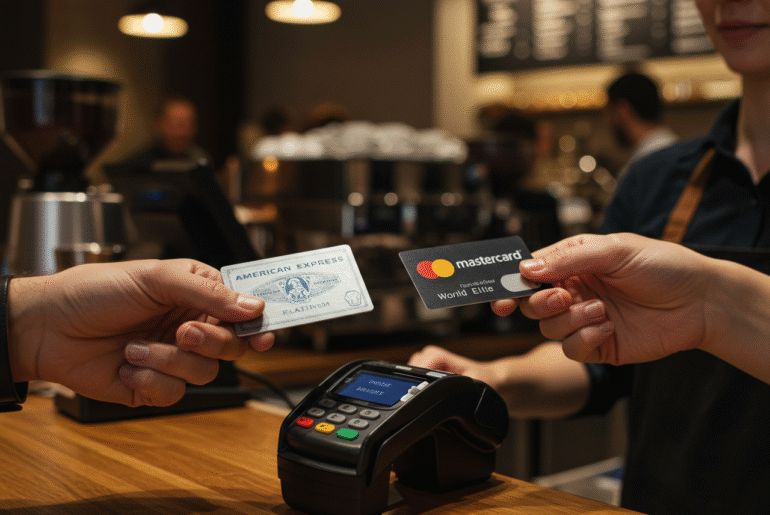This article may contain references to products or services from one or more of our advertisers or partners. We may receive compensation when you click on links to those products or services. Nonetheless, our opinions are our own.
The information presented in this article is accurate to the best of our knowledge at the time of publication. However, information is subject to change, and no guarantees are made about the continued accuracy or completeness of this content after its publication date.
Highlights
- American Express (Amex) is both a credit card issuer and payment network, while Mastercard is solely a payment processor that partners with banks.
- Amex cards often include luxury travel perks like airport lounge access and concierge service.
- Mastercard is accepted in more places globally, over 210 countries, compared to Amex’s 160+.
- Both offer solid rewards programs, but Amex Membership Rewards are known for high-value points and premium benefits.
- Amex typically charges higher annual fees but offers superior customer service and travel perks.
- You may need a higher credit score to qualify for Amex cards compared to many Mastercard options.
Introduction
Choosing the right credit card can feel overwhelming. There are many features to compare rewards, travel perks, global acceptance, annual fees, and more. Two of the biggest players in the credit card world are American Express (Amex) and Mastercard, and each brings something different to the table. So how do you choose the right one? This guide breaks down the major differences to help you decide which is better for your wallet and lifestyle.
Amex vs. Mastercard Basics
Both Amex and Mastercard operate as global payment networks, allowing users to make transactions worldwide. However, their business models are very different.
What Is American Express (Amex)?
American Express acts as both the issuer and network, managing its own cards (e.g., Amex Platinum) and processing payments. It’s well-known for:
- Premium customer service
- Generous rewards programs
- Travel benefits (e.g., airport lounge access)
- Higher annual fees
Amex cards typically cater to consumers with strong credit profiles and a preference for premium experiences.
What Is Mastercard?
Mastercard operates solely as a payment network. It partners with banks and credit unions, which issue the cards and determine rewards, rates, and features. Major advantages include
- Wider global acceptance (over 210 countries)
- Cards for all credit levels, including secured options
- Flexible card choices through multiple issuers
- Valuable perks like purchase protection and identity theft resolution
Differences Between Amex and Mastercard
| Feature | Mastercard | American Express |
|---|---|---|
| Primary Business | Payment network (processes transactions) | Financial services (issues cards directly, payment network) |
| Business Model | Primarily a technology company that licenses its brand to financial institutions for issuing cards. Does not directly issue cards to consumers. | Primarily a direct issuer of credit and charge cards to consumers and businesses. Also operates its own payment network. |
| Card Types | Credit, debit, prepaid cards (issued by partner banks) | Credit, charge, prepaid cards (primarily issued directly) |
| Global Acceptance | Widely accepted globally due to a vast network of issuing banks. | Extensive global acceptance, though historically slightly less universal than Mastercard/Visa in some regions. |
| Target Market | Broad consumer base across all income levels; strong focus on diverse payment solutions. | Traditionally caters to affluent individuals and businesses; strong emphasis on premium benefits and customer service. |
| Key Services | Payment processing, fraud prevention, data analytics, and loyalty programs (through partners). | Card issuance, payment network, travel services, financial advisory, and corporate services. |
| Revenue Source | Transaction fees, licensing fees, and data services. | Interchange fees, annual card fees, interest on outstanding balances, and merchant fees. |
| Customer Interaction | Indirectly through issuing banks and merchants. | Direct relationship with cardholders and merchants (for its own network). |
| Founded | 1966 (as Interbank Card Association) | 1850 |
Voted "Best Overall Budgeting App" by Forbes and WSJ
Monarch Money helps you budget, track spending, set goals, and plan your financial future—all in one app.
Get 50% OFF your first year with code MONARCHVIP
Payment Network Coverage
Here’s a look at how the two compare in terms of domestic and global use:
| Network | Domestic Acceptance | International Reach | Countries Supported |
|---|---|---|---|
| Amex | 99% | Moderate | 160+ |
| Mastercard | 99% | Extensive | 210+ |
- Amex is widely accepted online and in the U.S. but may be limited abroad.
- Mastercard is better suited for international travelers due to its broader reach.
Card Issuance and U.S. Acceptance
In the U.S., both cards are accepted at the majority of merchants. However:
- Amex issues its own cards and focuses on elite perks.
- Mastercard works with various banks, offering more entry-level and credit-building options.
This makes Mastercard more accessible, while Amex targets premium users.
Comparing Card Benefits and Rewards
Rewards Programs
Amex Membership Rewards offers:
- High points value for travel, dining, and select categories
- Flexible redemption options
- Enhanced rewards on premium cards
Mastercard rewards vary by issuer but often include
- Straightforward cashback options
- Store discounts
- Lower or no annual fees
Amex is ideal for high spenders seeking luxury perks. Mastercard fits everyday use and value-seeking users.
How to Choose Between Amex and Mastercard
What You Need to Get Started
To apply for either card type, you’ll typically need:
- A valid Social Security number
- Proof of income
- Employment information
- A recent credit history report
Your approval will depend on your credit profile, income, and financial history.
Steps to Choose the Right Card
1. Assess Your Spending Habits
Think about where your money goes: travel, groceries, dining, or daily expenses? This helps determine which rewards structure will benefit you most.
- Frequent travelers may prefer Amex.
- Everyday spenders might get better value from Mastercard cashback cards.
2. Compare Rewards and Fees
Weigh the benefits against the annual fee.
- Amex cards offer rich rewards but often come with high fees.
- Mastercard offers low- or no-fee cards with practical perks.
3. Check Acceptance Locations
If you shop or travel abroad, Mastercard’s global reach is a major advantage. If you mostly spend in the U.S., Amex is widely accepted domestically.
4. Consider Customer Support and Added Features
- Amex is known for white-glove customer service and luxury benefits.
- Mastercard offers solid security features and useful perks, depending on the issuing bank.
Final Thoughts
The best card for your wallet depends on how you spend, where you go, and what perks matter most.
- Choose American Express if you have a high credit score and want elite travel rewards and concierge-level support.
- Choose Mastercard if you value broad global acceptance, want low-fee options, or are building your credit.
There’s no one-size-fits-all solution; matching a card to your financial habits will help you get the most from your credit card experience.
Frequently Asked Questions
Is Amex accepted everywhere Mastercard is?
No. While Amex is widely accepted in the U.S., Mastercard is accepted in more places globally (210+ countries vs. Amex’s 160+). Always check with the merchant, especially when traveling internationally.
Which card gives better rewards?
Amex generally offers more valuable rewards for travel and dining through its Membership Rewards program. Mastercard’s rewards vary by issuer but often include practical cashback and discounts.
Which card is easier to get?
Mastercard is generally easier to qualify for, with options for all credit levels, including secured cards. Amex usually requires a higher credit score and stronger credit history.
Do both Amex and Mastercard have annual fees?
Yes. Amex cards often have higher annual fees due to premium benefits. Many Mastercard cards come with low or no annual fees. Always review the card’s terms before applying.

Reviewed and edited by Albert Fang.
See a typo or want to suggest an edit/revision to the content? Use the contact us form to provide feedback.
At FangWallet, we value editorial integrity and open collaboration in curating quality content for readers to enjoy. Much appreciated for the assist.
Did you like our article and find it insightful? We encourage sharing the article link with family and friends to benefit as well - better yet, sharing on social media. Thank you for the support! 🍉
Article Title: Amex vs. Mastercard: Best Card for You?
https://fangwallet.com/2025/06/14/amex-vs-mastercard/The FangWallet Promise
FangWallet is an editorially independent resource - founded on breaking down challenging financial concepts for anyone to understand since 2014. While we adhere to editorial integrity, note that this post may contain references to products from our partners.
The FangWallet promise is always to have your best interest in mind and be transparent and honest about the financial picture.
Become an Insider

Subscribe to get a free daily budget planner printable to help get your money on track!
Make passive money the right way. No spam.
Editorial Disclaimer: The editorial content on this page is not provided by any of the companies mentioned. The opinions expressed here are the author's alone.
The content of this website is for informational purposes only and does not represent investment advice, or an offer or solicitation to buy or sell any security, investment, or product. Investors are encouraged to do their own due diligence, and, if necessary, consult professional advising before making any investment decisions. Investing involves a high degree of risk, and financial losses may occur including the potential loss of principal.
Source Citation References:
+ Inspo
There are no additional citations or references to note for this article at this time.












































